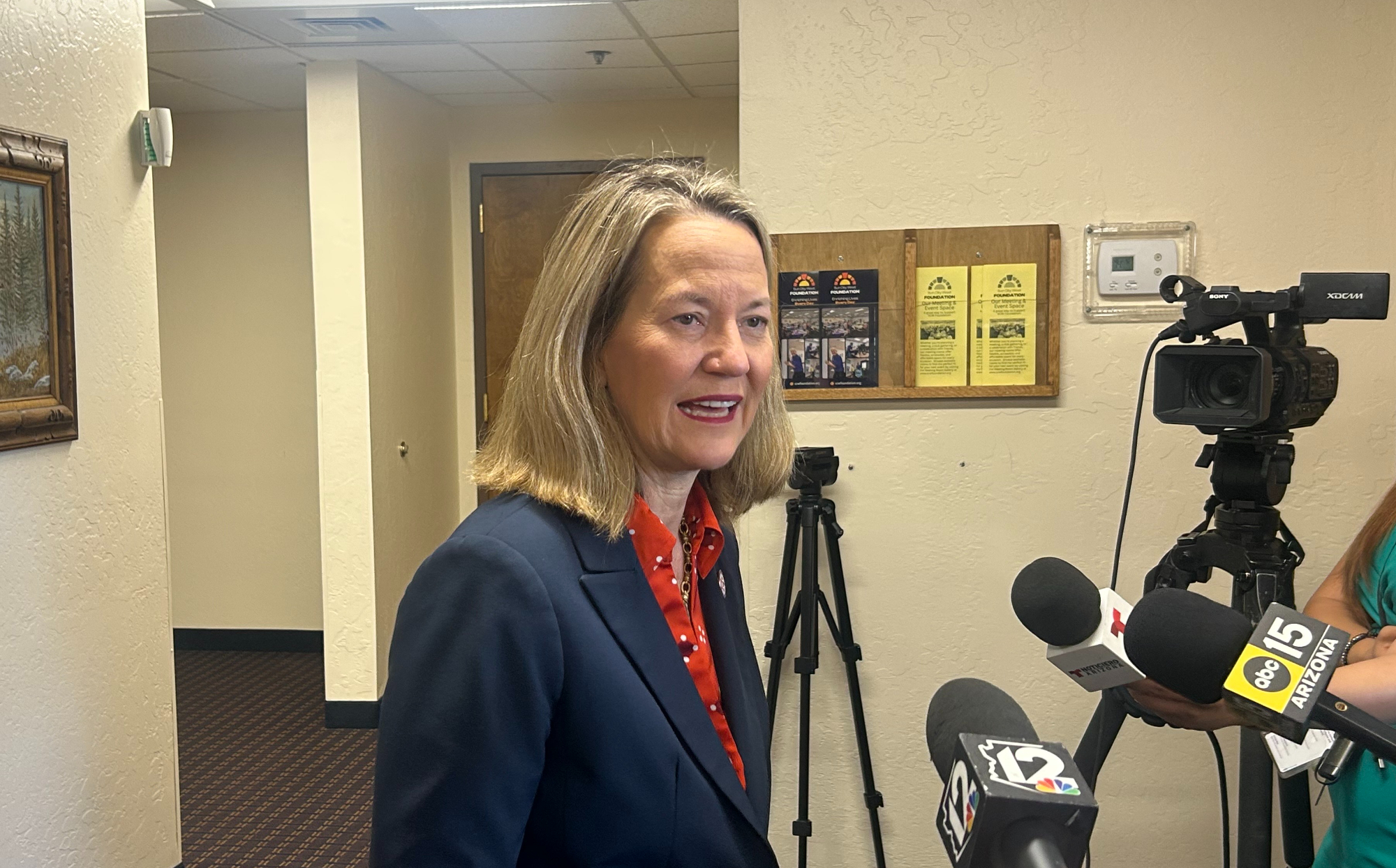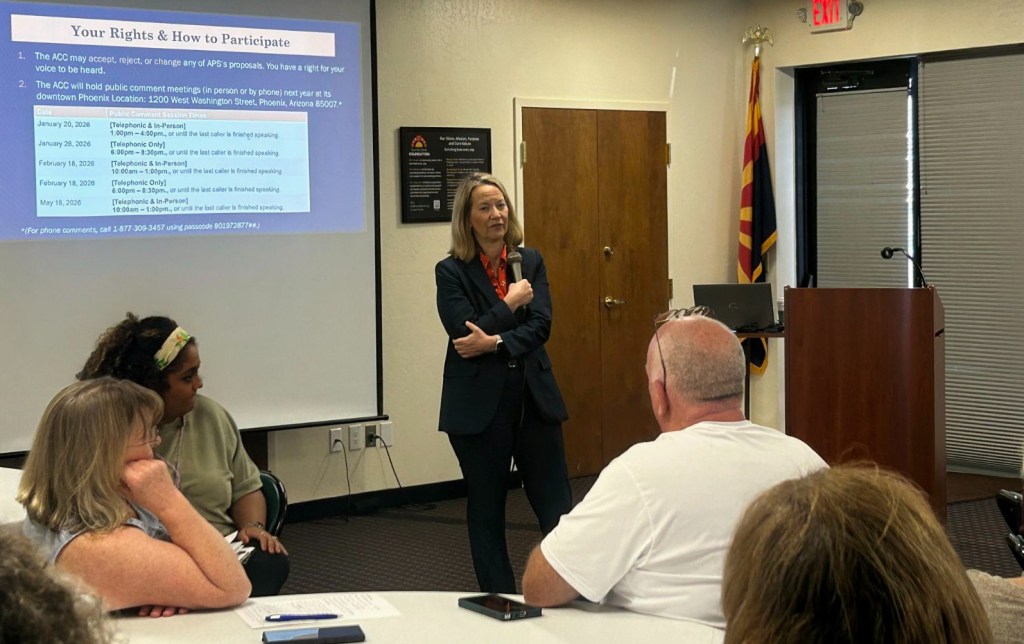
TJ L’Heureux

Audio By Carbonatix
Editor’s note: This story has been updated to include a response from APS.
***
If APS has its way, electricity bills in the Phoenix metro area and beyond will soon skyrocket. Arizona Attorney General Kris Mayes is trying to do something about it.
Arizona’s largest energy company — which serves about 1.4 million homes — is asking the Arizona Corporation Commission to let it increase the rates it charges customers by 14%. That’s on top of two 8% increases in both 2023 and 2024.
The corporation commission, a little-known but extremely powerful body sometimes referred to as Arizona’s “fourth branch of government,” is charged with balancing the interests of utility companies and people who use energy. But the commission, which is now completely controlled by Republicans, has green-lit rate increases for the last few years and made electricity far costlier for the average person.
Mayes, a Republican-turned-Democrat who formerly served on the corporation commission before she switched parties, has been approved to intervene in the public process. She argues that the commission is derelict in its state constitutional duty and that such a huge rate increase would unjustly burden Arizonans. She said no attorney general in the state’s history has intervened in this manner before.
“I’ve never seen a situation like the one we have now where the corporation commission is so skewed toward the utilities,” Mayes told reporters on Wednesday. “(Utility companies) keep coming in for rate increases because they keep getting them. The more this commission rolls over for them, the more they will continue to do it.”
The corporation commission has not returned a request for comment. In an email to New Times, APS spokesperson Jill Hanks said the utility company “look(s) forward to working with all intervenors, including the Attorney General’s office.” When APS announced the rate hike application in June, it said that “current rates have not kept pace with what it costs to operate a grid that provides the reliable, resilient energy our customers count on to power their lives.”
Mayes was speaking after a town hall she hosted in the West Valley retirement community of Sun City West. Speaking about 50 people in a packed room at the Sun City West Foundation, Mayes hoped to “gin up awareness” about the possibility of Arizona’s GOP-controlled commission raising rates again. She also asked attendees about the impact a rate hike would have on their lives.
“It’s an all-Republican commission right now. But I will tell you this — it was also an all-Republican commission when I served on the commission,” Mayes, who switched parties in 2019, told the room. “I have seen all-Republican commissions turn down rate increases.”
One woman in attendance highlighted that recent cost increases in Medicare and food — as well as products affected by tariffs — were already having a substantial impact in living with a fixed income.
“An increase of 14% seems outrageous to me, especially in light of the increases that have come before,” she said.

TJ L’Heureux
Data centers
Much of the conversation revolved around data centers. An influx of data centers is expected in the Valley in the near future, which will affect demand on the state’s energy grid as well as water availability. Mayes said the issue would weigh heavily on the rate case with APS.
A response echoed across the room: the data centers.
“Exactly — the data centers should pay for themselves,” Mayes responded, adding that there are ways in the rate-making process to force such an outcome. “These few data centers are coming to town, and we are being asked to subsidize them in the form of higher electricity rates — and that’s not even to speak of the amount of water these things use.
“As a state, I think we gotta grapple with this — and I just don’t see a lot of state leaders grappling with this question,” Mayes said. “But we are certainly going to grapple with it in this APS rate case.”
The commission is indeed considering instituting different rates specifically for data centers in order to ease the burden on the average consumer. “We want to get out ahead of this. We don’t want to be reactive,” commission chair Kevin Thompson told KJZZ in September. “We want to be very proactive in our approach and make sure that, you know, what we’re doing is right for the utilities and right for the consumers.”
Hanks told New Times that the APS rate case “proposes significant updates to evolve existing rates including a proposed ~45% increase for data centers, and the creation of a specific rate class for data centers, which will continue our efforts to ensure data centers will pay what it costs to serve their high electricity needs without shifting costs to existing customers. “
Town hall attendee Michael Colvin said that the data centers are often a drag on the local economy and don’t benefit the community.
“Cities that keep allowing these data centers need to understand how little a data center brings to them. They hire roughly 50 people to run them,” he said. “They are not employing your neighborhood.”
APS and the corporation commission have also generated headlines by walking back their commitments to renewable energy as the administration of President Donald Trump has yanked money from green energy projects.
Earlier this year, APS ditched a commitment it made in 2020 to use 100% clean energy by 2050, announcing investments in natural gas and extending the life of a coal plant in the process. The corporation commission has also begun the process of repealing its own requirement that utility companies obtain 15% of their energy through renewable sources. Mayes has suggested the commission’s repeal process might not be legal.
While the town hall attendees expressed a variety of opinions on the efficacy of certain types of energy, there seemed to be agreement that the rate increases were out of control.
One man named Charlie, who said he used to argue in favor of pro-solar policies before the corporation commission, said its makeup is quite different from what it used to be.
“They must have their own set of earplugs,” he said, “because they’re sure not listening to anything we have to say.”